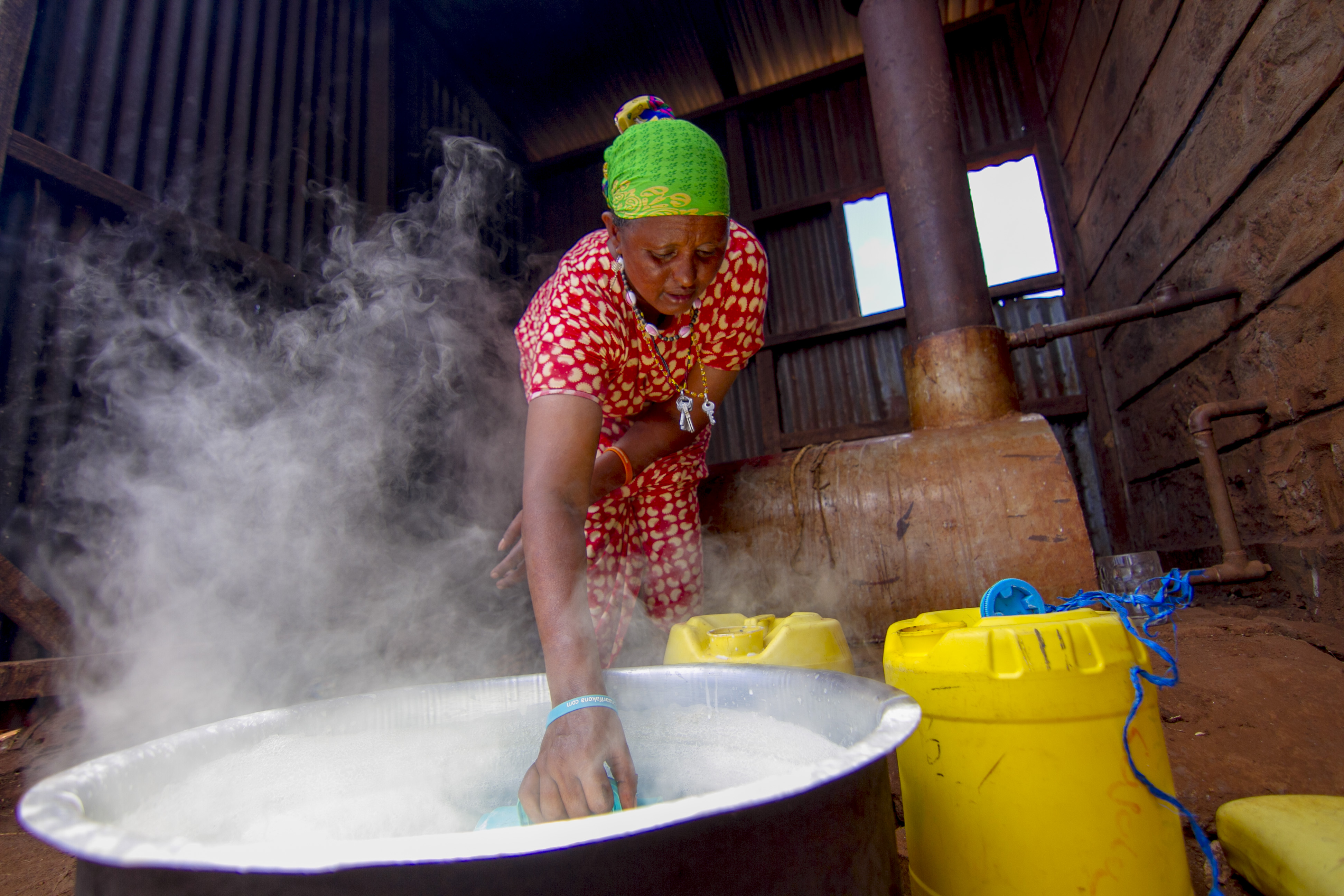The Mt. Marsabit Dairy is a women's cooperative diary in Marsabit County, northern Kenya that sources dairy products from individual suppliers and applies cutting-edge production techniques to offer longer life, affordable dairy products. The dairy supports the most vulnerable members of the community, especially pastoralist women, to earn a livelihood through a structured micro-milk collection system. These suppliers are most at risk and commonly excluded from dairy markets.
The dairy is now up and running with a sizeable customer base. It is a registered limited company with the capacity to scale the innovation up to meet the high demand for its fresh milk, ghee and yoghurt products. In 2011, Mary, a resident of Karare was attacked by a hyena while on her way to sell one litre of milk in Marsabit Town. Many inhabitants of Marsabit County, particularly women and children, depend on income generated by small quantities of milk and other dairy products they take to market, but the journey is long and fraught with danger.
The situation in Marsabit County for small dairy suppliers is precarious. It is what motivated a group of women from Karare to come together to devise a more efficient way to sell their dairy products, and so Mt Marsabit Women’s Dairy came into existence. The social enterprise seeks to support the most vulnerable members of communities, especially pastoralist women, to generate an income through a structured micro milk collection system.
Mt Marsabit’s reputation and customer base is growing. The business has expanded and now offers ghee and yoghurt products, as well as fresh milk.
The team is looking to create their own brand and establish larger-scale dairy production facilities. The all-women-team has participated in an intensive incubation programme provided by the innovation lab, Maarifa Kona. Working with a number mentors from the dairy industry, they have undertaken training in the areas of value addition, research and development, and branding and marketing. The team have set up a registered limited company. They have the capacity and growing customer base to scale their business to meet the high demand for their products. The company offers multiple benefits for surrounding communities, including reducing dangers for women travelling long distances to sell their dairy products; minimising loss of product due to poor storage facilities; improving the economic status of pastoralist women and creating employment.
The team has received support from the Kenya Agricultural Livestock and Research Organization in the form of training, a ghee-making machine and a milk depot, a permanent stone building. The International Institute of Rural Reconstruction has committed to covering 70 per cent of the total cost of refrigerated storage needed to upscale current production.
Mt Marsabit Women’s Dairy seeks an investment of GBP 15,500 over 18 months to scale the business and reach different markets within Marsabit County. The investment will support processing, packaging and branding, market research, establishing ICT systems and expanding the business’ distribution model.
Over the next three years, the team plans to reach out to 1000 small-scale milk producing households and set up milk collection points closer to vulnerable women suppliers, thereby improving market access for a significant number of pastoralist women. At the current rate of expansion, the business expects to make KES 10,800,000 selling milk to customers in Karare and surrounding areas, KES 252,000 in ghee sales and 576,000 in yoghurt sales.
More detail about the innovation
Problem: Women lack access to suitable markets to sell their dairy products. They have to walk long distances and face considerable dangers for small incomes. Their product is also at risk with inadequate refrigerated containers. Often, these small-scale suppliers cannot reach the market in time before the product spoils.
Solution: Micro-milk collection and processing facilities established in rural areas that employ vulnerable women and work with small suppliers to guarantee fair prices for local dairy products.
Current Status: Mt Marsabit Women’s Dairy Ltd. is registered as a limited company. It is in production in Karare, Marsabit County.The business is supported by Maarifa Kona, a consortium between Adeso, iHub and Mastercard.
Business Model: Over 3 years, the team will reach out to 1000 small-scale milk producing households and set up milk collection points closer to vulnerable women suppliers.
Sales Forecast: In 18 months, the business expects to make KES 10,800,000 selling milk to customers in Karare and surrounding areas, KES 252,000 in ghee sales and 576,000 in yoghurt sales.
Proposition: Seeking an investment of GBP 15,500 over 18 months to scale the business and reach different markets within Marsabit County. This will support processing and storage equipment, packaging and branding, market research, establishing ICT systems and expanding the business’ distribution model.
Prospects: Mt Marsabit is in production, run by a cooperative of 30 women and selling to customers in Karare and beyond. Its reputation and reach is growing.
Founders: Sabdiyo Lologol and Agnes Karanja – the dairy cooperative comprises 30 women.
Contact: Email: sabdiyolologol2017@gmail.com and agneskaranjangugi@yahoo.com Tel: +254 726 661038/+254 718277908
Read more about other innovations from the DEPP Innovation Labs.

